There could be many different reasons for your bladder problems, including specific medical conditions, lifestyle choices, and your overall health. If you suffer with bladder problems regularly, then you will be fully aware of just how much these issues can have a negative impact on your everyday life. Not only are you likely to feel physical pain and discomfort but bladder problems can also cause you to worry and become anxious, therefore affecting your mental health too.
Not only are there different types of bladder problems but there are various reasons why these issues arise. Certain people are also more prone to having bladder issues. If you do suffer from bladder problems, there is a good chance you can relieve symptoms through good habits in addition to supplements and medication.
Types of bladder problems
The two most common types of bladder problems which you are likely to experience are Overactive Bladder (OAB) and Urinary Tract Infection (UTI), more specifically a bladder infection. Each of these bladder problems have different causes, symptoms and potential treatments. Something else which might occur as a result of bladder problems are bladder stones. Although certain issues are more complicated than others, there are things you can do in order to help reduce the risk of having bladder problems in the future. If you have bladder problems on a regular basis then you may be asking yourself why these issues reoccur. Speaking to your GP is advisable as your doctor may help to identify why you continue to suffer with bladder problems.
What is overactive bladder?
Around 12% of the total adult population suffer from an overactive bladder, also known as OAB syndrome. OAB syndrome is a condition which means you are incapable of holding your urine normally. Overactive bladder often gets confused with urinary incontinence however this is just a symptom linked to having an overactive bladder and is not a condition. People with overactive bladder can experience a range of symptoms. Having overactive bladder can cause anxiety and stress, impacting negatively on your quality of life by disrupting your daily routine and also your sleep pattern.
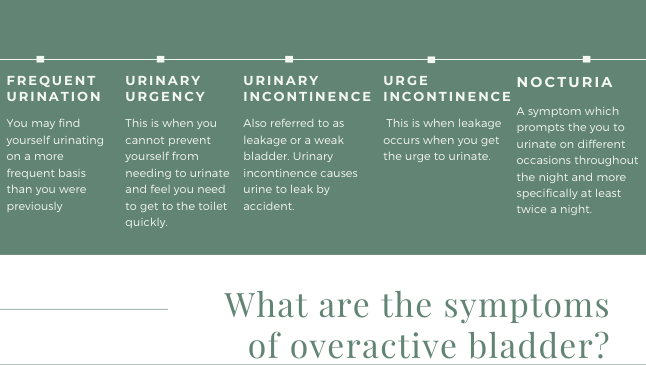
What can cause overactive bladder?
You may have overactive bladder for a range of different reasons. Your OAB may be a result of a medical condition, lifestyle choices or a combination of both. If you have overactive bladder there are also certain foods and drinks you may want to avoid, and also specific lifestyle choices you may have to make to ensure you do not worsen the problem. Overactive bladder is more common in the elderly and slightly more prevalent in women than it is in men, however this could be a consequence of females being more likely than males to report symptoms of OAB.
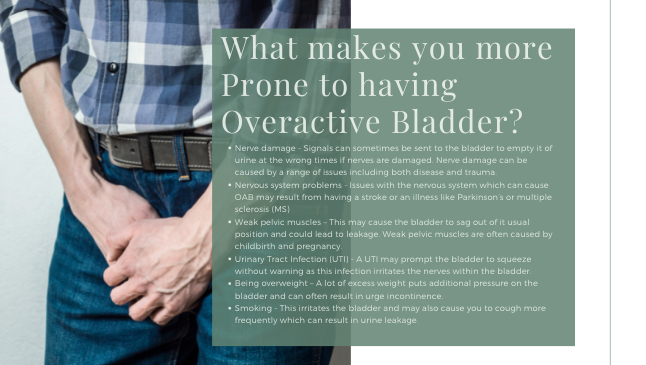
Which food and drink can worsen overactive bladder symptoms?
If you suffer from overactive bladder then you may be looking for ways to reduce the symptoms. Avoiding certain types of food and drink, switching to a healthier lifestyle and carrying out certain exercises might help to relieve some of these symptoms. We take a look at what you can do in order to relieve OAB symptoms below:
Tea and coffee – Although not necessarily a direct cause, the caffeine within both tea and coffee can exacerbate overactive bladder symptoms. Like alcohol (see below), caffeine is a diuretic which means it results in a greater urine output.
Alcohol – Limiting the amount of alcohol is also recommended if you have overactive bladder. The alcohol within the likes of beer, wine and spirits can disturb signals to the brain which are informing you that you have bladder overflow.
Citrus fruits – Fruits which fall into this category include lemons, oranges, limes and grapefruits. Research has shown that citric acid worsens bladder control. You should still include fruits as part of your diet but less acidic options like apples and bananas are recommended.
Tomatoes & tomato related products – Just like the fruits mentioned above, tomatoes contain citric acid which can irritate the bladder. There are also a range of tomato-based products which can exacerbate bladder problems too, such as pasta sauce, salsa and ketchup.
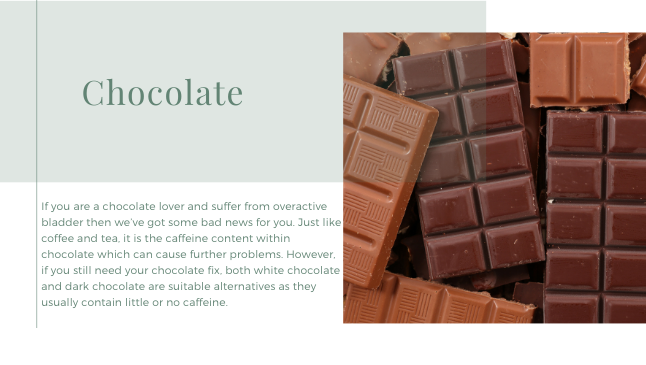
Carbonated Drinks – Aggravation to the bladder can be caused by carbonated drinks if you have OAB. The culprit seems to be the fizz within these drinks. Carbonated drinks which also contain caffeine can provide a double whammy for those struggling with overactive bladder.
Spicy (Hot) Foods – Spicy and hot foods, containing chilli peppers and spices, can cause irritation to the bladder. However, if you have overactive bladder and are a fan of spicy food then it is a good idea to experiment first before cutting out your favourite spicy foods altogether.
Processed Foods – The problem with processed foods is that they contain artificial flavourings and preservatives which can irritate the bladder and increase OAB symptoms.
Sweeteners – These are often used as a substitute for sugar in many soft drinks. Both artificial and natural sweeteners, however, can further increase the severity of overactive bladder.
Cranberries – Although cranberries and cranberry juice are considered effective for relieving symptoms of UTI’s and bladder infections (more about that later) they are not recommended for OAB because the acidic nature of cranberries can irritate the bladder.
Onions – Onions, particularly when raw, are said to cause people with overactive bladder to have an increased urge to urinate. Cooked onions are considered a better option for those with OAB
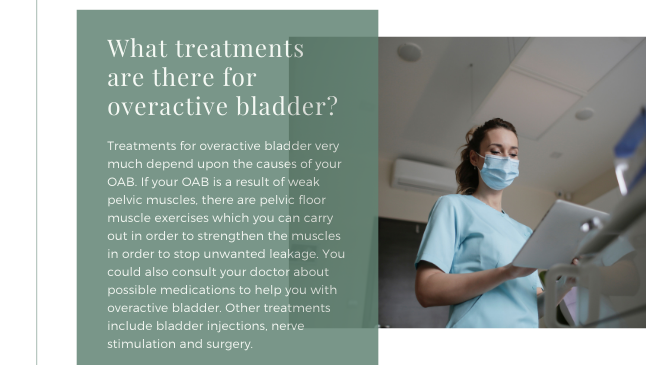
What is a Urinary Tract Infection (UTI)?
A Urinary Tract Infection is an infection in any part of the urinary tract which includes the kidneys, bladder and urethra. Here are the specific names for these three different types of UTI:
Bladder Infection – Cystitis
Urethra Infection – Urethritis
Kidney Infection – Pyelonephritis
As we are focusing primarily on bladder problems, we will take a closer look at cystitis, its symptoms, causes, and how this infection can be both prevented and treated.
What is cystitis?
Cystitis, which is also known as a bladder infection or water infection, is inflammation of the bladder and is among the most common forms of UTI. It is caused by bacteria entering the bladder via the urethra, which is the tube which carries urine out of the body. Although uncomfortable and irritating, cystitis is not usually considered a serious problem and either antibiotics or natural supplements (or a combination of both) can usually relieve symptoms quickly. Mild cystitis will often go away naturally without any treatment at all. However, some bladder infections which are left untreated can lead to more serious problems like kidney infections. Bladder infections are more common in women than they are in men as a result of the female urethra being short and also its closer proximity to the anus.
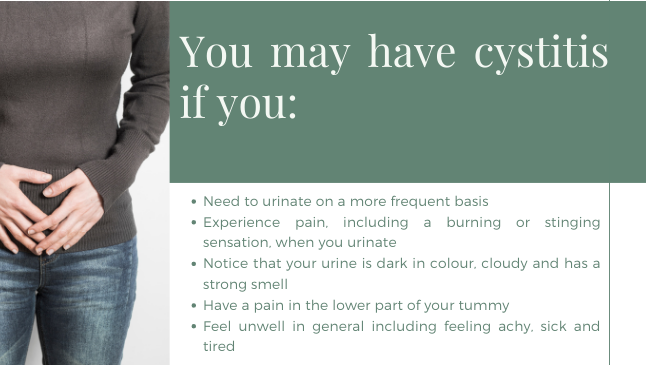
What makes you more likely to suffer from cystitis?
Being sexually active (women) – Females will sometimes get cystitis from having sex as a result of bacteria entering the urinary tract via the urethra. It is recommended that women pee after sex as this can cleanse the urethra from potentially harmful bacteria which could cause infection.
Wiping from Back to Front (women) – After going to the toilet it is recommended that females wipe from front to back as this will help to prevent bacteria from entering the urethra.
Having a urinary catheter (thin tube) inserted into your urethra to help to drain the bladder of urine
If you are pregnant – This can place greater pressure on the bladder and therefore make you more susceptible to getting cystitis
Having diabetes – High sugar levels in the urine can make the bladder a breeding ground for bacteria.
Using a diaphragm for contraception – Spermicides in diaphragms can kill ‘good’ bacteria in the vagina and therefore increase the chances of ‘bad’ causing infections
Having a weakened immune system – Your immune system may have an overaction to a previous infection and this can therefore make you more prone to bladder infections in the future
What to do for Cystitis?
If you have cystitis then you will want to relieve the symptoms quickly, particularly if you are experiencing pain when you go to the toilet. There are ways in which you can potentially relieve cystitis symptoms without having to visit your GP and these are:
Drink plenty of water – This helps to ‘flush out’ bacteria from your bladder and will hopefully lead to a quicker recovery from your bladder infection
Take natural supplements like D-mannose – which is a natural sugar. You can also take cranberry capsules to help relive the symptoms of cystitis.
Take ibuprofen or paracetamol – This will provide pain relief from cystitis
Urinate frequently – Pee regularly and ensure you empty your bladder fully when you go to the toilet
Avoid having sex – This could agitate the area further, may cause pain and could lead to more bacteria entering the bladder
When should you visit your GP for cystitis treatment?
If you are struggling to get rid of cystitis or have particularly bad symptoms, then you should visit your GP. It is likely that your GP will prescribe you antibiotics in order to eradicate the infection.
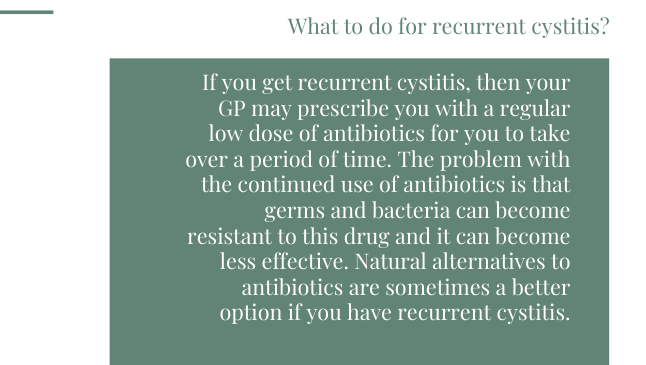
D-mannose for recurrent cystitis and prevention
This simple sugar has been used by those suffering from recurrent cystitis. It is thought that D-mannose has the capability to eradicate the harmful E. Coli bacteria which causes cystitis in the first place by attaching itself to the bacteria before being removed from the urinary tract during urination. D-mannose is considered safe for long-term use with the vast majority of people who have taken D-mannose reporting no side-effects. D-mannose can be bought in either capsule or powder form. If you suffer from bladder infections on a regular basis then you may see D-mannose as a potential long-term alternative to antibiotics and a natural way of managing and preventing cystitis.
Cranberry capsules for recurrent cystitis and prevention
Studies have shown that Cranberry Capsules can be effective when it comes to tackling recurrent bladder infections and UTI’s. Cranberry contains something called A-type proanthocyanidins (PACs) and this helps to prevent the E. coli bacteria from adhering to the bladder wall and causing cystitis.
What are Bladder Stones?
Bladder stones form within the bladder as hard lumps of minerals. Both men and women can get bladder stones, but they are more prevalent in men over the age of 50.
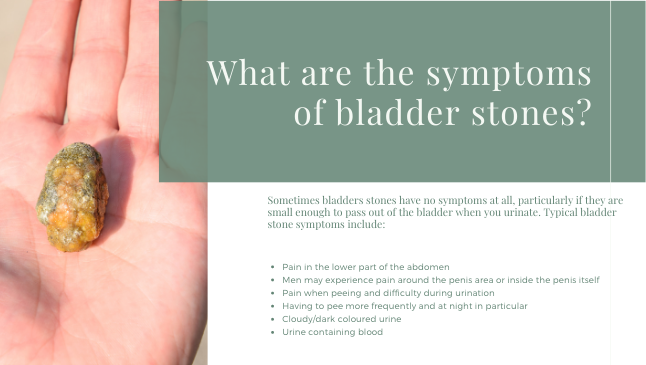
What causes bladder stones?
Bladder Stones occur when you cannot fully empty your bladder of urine. One of the waste products in urine is called urea. This waste product is made up of nitrogen and carbon and if urine remains in your bladder the chemicals within urea will form crystals which harden over time to form bladder stones.
What makes you more prone to getting bladder stones?
Having an enlarged prostate (men) – Prostates are a small gland, found only in men, between the penis and the bladder. Older men might experience enlarged prostate, and this causes the prostate to press on the urethra and therefore block the flow of urine. If this is not treated, then this can lead to an increased risk of getting bladder stones.
Neurogenic Bladder – This refers to the nerves which control the bladder being damaged. This nerve damage prevents someone with Neurogenic Bladder from emptying their bladder fully. This can be caused by damage to nerves in the spine in addition to motor neurone disease and spina bifida. Those with neurogenic bladder usually have a tube named a catheter inserted in order to drain the bladder but this can still leave some urine inside the bladder.
Cystocele (women) – This a condition which only affects women. Cystocele causes the bladder wall to become weaker and drop down into the vagina, therefore blocking the flow of urine out of the bladder.
Poor Diet – It is unusual for bladder stones to be a result of a poor diet in the UK and is much more common in the developing world. A diet which is rich in foods containing high amounts of fat, salt and sugar and not containing enough vitamins including vitamin A and B makes it more likely for bladder stones to develop.
How do you know if you have got bladder stones?
If you are displaying any symptoms of bladder stones including abdominal pain and cloudy/dark urine, then you need to go and see your GP. Here is how your doctor will diagnose bladder stones:
Urinalysis – This is used to identify any crystallisation, infection or any another abnormality in your urine.
CT Scan – The specific type of CT scan used to diagnose bladder stones is called a Spiral CT scan and is more effective than normal CT scans. This scan will check for any complications within your bladder.
Pelvis ultrasound – By using soundwaves, this ultrasound is capable of creating images of the inside of your body and these will help your doctor to see if stones are present within your bladder.
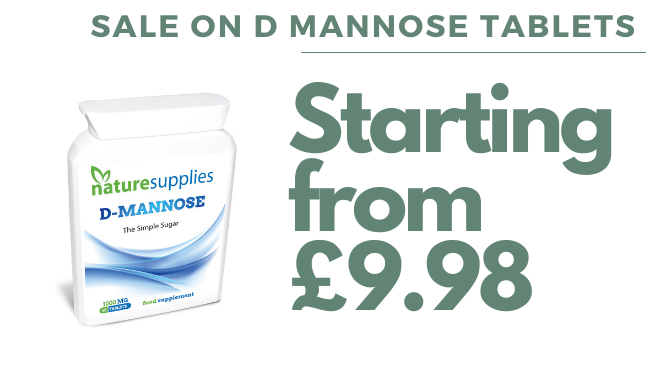
X-Rays and intravenous pyelogram
An X-Ray will be able to see inside the bladder and highlight any abnormalities which are present.
With an intravenous pyelogram, you will have a dye injected within your veins, flowing through your blood before reaching your bladder. The dye will help to bring any abnormal formation to the attention of doctors and an X-Ray will be taken to show these results.
How do you get rid of bladder stones?
Sometimes, bladder stones will pass naturally, particularly if they are small. If this is not possible then procedures must be taken to remove the stones:
Breaking bladder stones apart – This involves a small tube with a camera attached being inserted into the bladder to enable the doctor to see where the stone is. Once the stone has been located, a laser, ultrasound or alternative method is used to break the stones into smaller pieces before flushing them from the bladder.
Removing bladder stones through surgery – Sometimes the bladder stones are too large to be broken up and therefore need to be removed through surgery by your doctor.
References
https://www.mayoclinic.org/diseases-conditions/urinary-incontinence/symptoms-causes/syc-20352808
https://www.healthline.com/health/overactive-bladder-vs-urinary-incontinence-vs-uti
https://www.nhs.uk/conditions/bladder-stones/
https://www.healthline.com/health/11-foods-to-avoid-if-you-have-oab
https://www.nhs.uk/conditions/urinary-tract-infections-utis/
